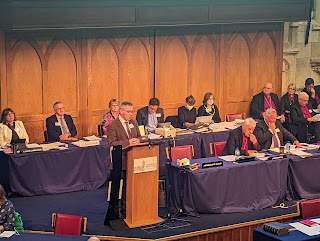Synod speech on Fossil Fuel Divestment 2018
Your Grace, members of Synod.
The motion before us today is about the ethics of investments. Investments that provide funds for the work and mission of the church – from pensions to priorities and the episcopate.
In the Bible, mission is often described as a journey. And as we move forward in mission, the impact of climate change – its effects on people and our response – will deeply affect our mission.
So, let us pause and survey the landscape of the last year. How has the RCB responded to the environmental challenge and what is happening in the world?
In the last 12 months the RCB has responded very positively. It has started a number of environmental projects and has managed investments wisely. This is good news and the RCB team need to be applauded for this.
But around the world in the last year the impact of climate change on people is very real,
- I see Maria from Kiribati Island in the Pacific, whose crops are ruined by salt water intrusion from the rising sea.
- I see farmers in Ireland struggling to feed their animals because it was too wet to let them graze outside. Ireland has had the wettest decade in 300 years.
And as I look out across the landscape I hear voices crying.
- I hear Bishop Hilary in South Sudan calling for prayer for a drought stricken province where violence, famine and a refugee crisis is growing
Do you see the people suffering? Do you hear their cries?
Last November the Archbishop of Canterbury, Justin Welby, said this,
“Climate change is pushing us toward disaster. It is not a distant danger – it is already with us. As we continue to burn fossil fuels, its effects will only grow.”
This leads us to a profound ethical question. How can we continue to fund our mission by investing in fossil fuels when they cause human suffering?
There is a strong ethical case to end fossil fuel investments. But it also makes sound financial sense.
Scanning the financial landscape of the last year reveals two things.
Firstly, collaborative engagement has broadened its scope. The RCB supports the Climate Action 100+ which is a positive initiative that engages with the largest energy, food, transport and chemical companies.
Secondly, publications like the Financial Times are reporting that institutional divestment from fossil fuels is growing.
- Universities have divested: including Trinity College Dublin and Queen’s University Belfast. Edinburgh University, that had previously excluded coal and tar-sands, just like we have, decided in February this year to exclude all fossil fuels within 3 years.
- Cities have divested – London, Paris and New York are moving billions of dollars out of this polluting industry. $58 billion dollars were divested in March this year.
Institutional investors have looked at the risks and concluded that divestment from all fossil fuels is the right thing to do.
So, having looked at the positive steps, the storms and financial response, can we see a way forward?
This motion proposes three things:
First, we continue to support the RCB’s climate change engagement with some of world’s largest companies.
Second, we encourage the RCB to keep investing in renewable energy including wind, solar and forestry. Renewable energy is now the cheapest, and the fastest growing, form of new energy worldwide.
Third, the RCB has done an excellent job in reducing exposure to fossil fuels. It has gone from 11% of the fund to just 2.5% in 7 years; this is a reduction of over 1% per year. Supporting this motion means we can continue on this path so by 2020 we exclude virtually all fossil fuels.
Mark Carney, the Governor of the Bank of England, told insurers in February,
“Once climate change becomes a clear and present danger to financial stability, it may already be too late,”
Just two weeks ago a survey of fund managers found that 90% of managers expect international oil companies to be negatively revalued within a few years due to climate change related risks.
Reducing exposure to fossil fuel investments is both wise and it is ethical.
In the Irish landscape we often see standing stones; in the Old Testament people raised stones to remember times when God had helped them.
Today, with this motion, we can raise a standing stone in the landscape of the mission of our church. Let us mark the day, when with God’s help, we decided that the Church of Ireland is truly an ethical investor and excludes all fossil fuels.
As Archbishop Thabo, the Head of the Anglican Communion Environmental Network said last month at the Commonwealth leaders meeting,
“The poorest struggle to thrive amidst our changing climate.…. Now is the time to act.”


Comments